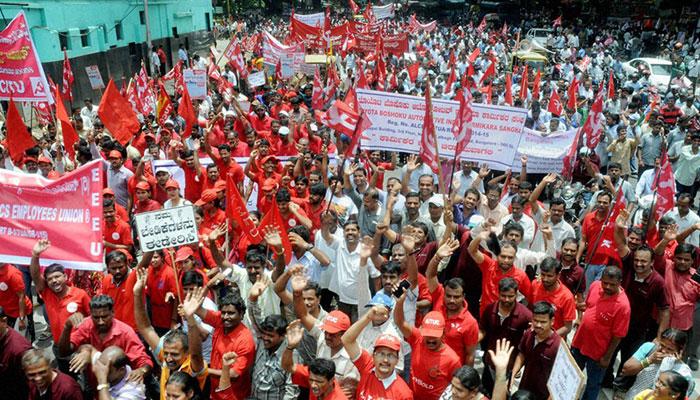Modi should condemn unions
Ravi Shanker Kapoor | September 3, 2016 1:11 am

If Prime Minister Narendra Modi is really serious about “rapid transformation,” as he recently said, he has to take on the obstinate trade unions—including the one of saffron hue. Placating them has served no purpose, and will serve none in the future. The reason is simple: all of them are doctrinally opposed to the course he wants to chart for the Indian economy.
The fact that the RSS-affiliated Bharatiya Mazdoor Sangh (BMS) did not participate in the nation-wide strike on September 2 called by all other major central trade unions is small comfort, as the BMS too is little different from other unions on all critical issues, be it foreign direct investment (FDI) or privatization. At any rate, the bandh evoked a good response in Bihar, Odisha, Kerala, and Punjab and some effect in Puducherry and Karnataka. Tamil Nadu and Mumbai were not affected. Work at major public sector undertakings (PSUs) such as the Visakhapatnam Steel Plant (Rashtriya Ispat Nigam Limited) suffered. Which shows that the trade union movement may be down but it surely is not dead.
The BMS accepted Finance Minister Arun Jaitley’s announcement of increasing the minimum wages for unskilled non-agricultural laborers from Rs 246 to Rs 350 a day (or Rs 9,100 a month) and the release of a two-year bonus to state government employees, but Congress and Left unions were intransigent. This, however, does not make the BMS reasonable; its position on most issues remains socialistic.
Trade unions exceed their brief by agitating against disinvestment in PSUs and FDI in the Railways, defence, and insurance sectors. Unions are expected to represent employees, whose concerns are the quantum of increment, working conditions, healthcare facilities, social security benefits, etc. Besides, which worker in a right frame of mind would oppose FDI or multinational corporations (MNCs)? Everybody—except of course intellectuals—knows that MNCs pay well and treat their employees in a manner much better than in which domestic companies do. Therefore, trade unions campaigning against economic policy mostly represent their respective political parties, not employees.
This raises the issue of the representativeness of trade unions in the first place. Whose interests are they bothered about anyway? Of the employees they claim to represent, or the political parties they are associated with?
The Congress and Left unions want the monthly minimum wage to be almost doubled, at Rs 18,000, along with an assured minimum monthly pension of Rs 3,000. On the face of it, a high minimum wage is a pro-poor measure. The reality, however, is the opposite. It is a well-known fact that wages are paid according to the market rate—and not just in the states ruled by ‘bourgeois’ parties like the Congress and Bharatiya Janata Party.
The website of the Communist Party of India (Marxist-Leninist), in a 2002 article, said, “The minimum wage fixed by the state government for the agrarian laborers is Rs 62.10, with some regional variations. But to get it in reality remains a dream for agrarian laborers everywhere. Generally, they get Rs 28 to Rs 35 plus 2 kg of rice, and in some places the wages are as low as Rs 20 to Rs 25 only. Most of the agrarian laborers (their total number being more than 70 lakh) are getting jobs for only 100 to 130 days a year.”
The CPI (ML) is a rival of the CPM, but its findings are buttressed by other sources as well. There are a number of scholarly studies showing that during its 34-year rule in West Bengal, the Left Front was unable to ensure minimum wages (which was on a lower side as compared to the rates in other states) to workers.
The Congress, Left parties, and the unions controlled by them cannot be unaware of this reality. So, the fact that they are stubbornly sticking to a fantastically high figure only proves that their insistence on high minimum wages is inspired by politics rather than workers’ welfare.
It is a truth universally acknowledged that prosperity can neither be legislated nor executed by fiats; otherwise, every well-meaning ruler would have transformed his country into a Garden of Eden. But, alas, that is not to be! The only way out of poverty and underdevelopment is fast, private sector-led growth to which Modi is indeed committed.
But the problem is that he is hamstrung not as much as by the Congress, which is led by an ailing chief and her flailing son, or even the commies, who have politically battered, but by his own flock. Like the Hindutva cowboys who are giving a bad name to the Prime Minister and his party, the BMS-types in the economic arena are an albatross around his neck. He rightly castigated the cowboys; it is time he took on the BMS dinosaurs as well.






























